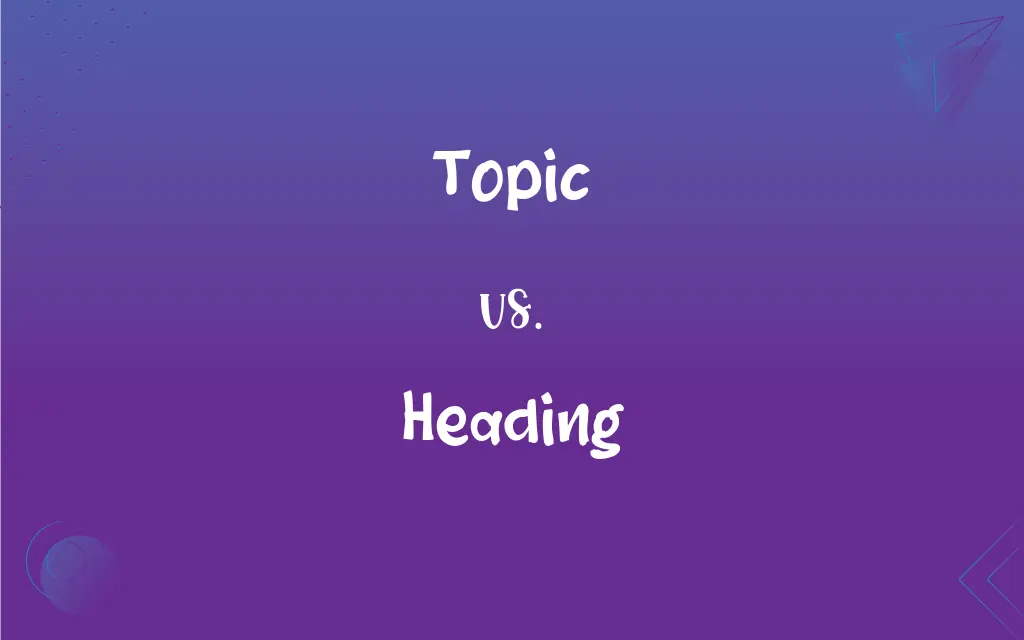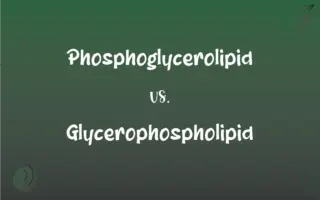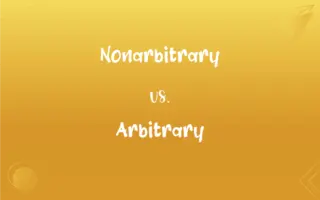Topic vs. Heading: What's the Difference?
Edited by Harlon Moss || By Janet White || Updated on October 4, 2023
A topic is the subject or main idea of discussion, while a heading is a title or label that introduces a section or categorizes information.

Key Differences
When we refer to a topic, we're addressing the central theme, idea, or subject of a piece of writing, discussion, or debate. Topics guide the content and provide a reference point for the audience, helping them understand what the material is primarily about. In contrast, a heading functions as a concise title or label for a particular section, categorizing information and making the content more accessible and organized.
Headings are instrumental in breaking down larger texts into readable and structured sections. They act as signposts for readers, offering a quick overview of the content that follows. A heading, essentially, doesn't give in-depth details but gives a clue about the subsequent content. Topics, on the other hand, encapsulate the overarching theme or idea, encompassing all the information, arguments, and ideas presented within the content.
For instance, in an article about global warming, the topic would be 'global warming,' which serves as the main theme of the entire article. However, the article might have multiple headings such as 'Causes of Global Warming,' 'Effects on Polar Regions,' and 'Mitigation Strategies.' These headings demarcate various sections, each focusing on specific aspects of the broader topic.
To put it differently, topics provide a macro perspective, representing the main idea or the crux of a discussion, while headings break down this main idea into more manageable, micro elements, helping to structure and organize the content. Both play a vital role in content presentation, ensuring clarity and coherence for the reader.
Comparison Chart
Definition
Central theme or subject
Title or label for a section
ADVERTISEMENT
Purpose
Guides content & sets main idea
Organizes & categorizes content
Scope
Broad and overarching
Specific to a particular section
Detail Level
General idea
Brief, concise introduction
Use in a Document
Represents overall theme
Breaks down content into sections
Topic and Heading Definitions
Topic
The primary focus of a conversation.
They shifted the topic from movies to books.
ADVERTISEMENT
Heading
Title or label for a section.
The first heading in the report reads Introduction.
Topic
Subject of discussion or writing.
The main topic of her speech was environmental conservation.
Heading
Signpost in a document.
The Methods heading introduced the research techniques used.
Topic
A matter dealt with in a text.
The research paper tackled the topic of renewable energy.
Heading
A categorizing title.
Under the heading Financial Data, she listed all the expenses.
Topic
Main subject in a particular field.
His favorite topic in history is the Renaissance era.
Heading
Brief descriptor of content.
Each chapter starts with a bolded heading for clarity.
Topic
Central theme or idea.
The novel's topic revolves around love and sacrifice.
Heading
The title, subtitle, or topic that stands at the top or beginning, as of a paragraph, letter, or chapter.
Topic
The subject of a speech, essay, thesis, or discourse.
Heading
The course or direction in which a ship or aircraft is pointing or moving.
Topic
A subject of discussion or conversation.
Heading
A gallery or drift in a mine.
Topic
A subdivision of a theme, thesis, or outline.
Heading
The end of a gallery or drift.
Topic
(Linguistics) A word or phrase in a sentence, usually providing information from previous discourse or shared knowledge, that the rest of the sentence elaborates or comments on. Also called theme.
Heading
Present participle of head
Topic
Topical
Heading
The title or topic of a document, article, chapter, or of a section thereof.
Put the information under the "Advantages" heading
Topic
Subject; theme; a category or general area of interest.
A society where a topic cannot be discussed, does not have free speech.
Stick to the topic
An interesting topic of conversation
Romance is a topic that frequently comes up in conversation
Heading
(nautical) The direction into which a seagoing or airborne vessel's bow is pointing (apparent heading) and/or the direction into which it is actually moving relative to the ground (true heading)
Topic
(Internet) Discussion thread.
Heading
Material for the heads of casks, barrels, etc.
Topic
(music) A musical sign intended to suggest a particular style or genre.
Heading
(mining) A gallery, drift, or adit in a mine; also, the end of a drift or gallery; the vein above a drift.
Topic
(obsolete) An argument or reason.
Heading
(sewing) The extension of a line ruffling above the line of stitch.
Topic
An external local application or remedy, such as a plaster, a blister, etc.
Heading
(masonry) The end of a stone or brick which is presented outward.
Topic
One of the various general forms of argument employed in probable as distinguished from demonstrative reasoning, - denominated by Aristotle to`poi (literally, places), as being the places or sources from which arguments may be derived, or to which they may be referred; also, a prepared form of argument, applicable to a great variety of cases, with a supply of which the ancient rhetoricians and orators provided themselves; a commonplace of argument or oratory.
These topics, or loci, were no other than general ideas applicable to a great many different subjects, which the orator was directed to consult.
In this question by [reason] I do not mean a distinct topic, but a transcendent that runs through all topics.
Heading
(flags) A strip of material at the hoist end of a flag, used for attaching the flag to its halyard.
Topic
An argument or reason.
Contumacious persons, who are not to be fixed by any principles, whom no topics can work upon.
Heading
The act or state of one who, or that which, heads; formation of a head.
Topic
The subject of any distinct portion of a discourse, or argument, or literary composition; also, the general or main subject of the whole; a matter treated of; a subject, as of conversation or of thought; a matter; a point; a head.
Heading
That which stands at the head; title; as, the heading of a paper.
Topic
An external local application or remedy, as a plaster, a blister, etc.
Heading
Material for the heads of casks, barrels, etc.
Topic
Topical.
Heading
A gallery, drift, or adit in a mine; the vein above a drift.
Topic
The subject matter of a conversation or discussion;
He didn't want to discuss that subject
It was a very sensitive topic
His letters were always on the theme of love
Heading
The extension of a line ruffling above the line of stitch.
Topic
Some situation or event that is thought about;
He kept drifting off the topic
He had been thinking about the subject for several years
It is a matter for the police
Heading
That end of a stone or brick which is presented outward.
Heading
A line of text serving to indicate what the passage below it is about;
The heading seemed to have little to do with the text
Heading
The direction or path along which something moves or along which it lies
Heading
A horizontal (or nearly horizontal) passageway in a mine;
They dug a drift parallel with the vein
Heading
Organizational tool in writing.
The article was well-structured with clear headings.
FAQs
How does a topic guide content?
A topic provides a reference point, determining the primary focus and direction of the content.
Can a topic and heading be the same?
While possible, typically a topic is broader, and headings break down the topic into specific sections.
Is a heading necessary for every written piece?
Not always; while headings are useful for longer pieces, short texts may not require them.
What's the relationship between a topic and its content?
The topic is the overarching subject, while the content provides details and discussions related to that topic.
What is a topic in writing?
A topic is the central theme or main subject of a piece of writing.
Is the topic the same as a thesis statement?
No, while a topic sets the subject, a thesis statement presents the main argument or point about that topic.
How can one choose effective headings?
Effective headings are concise, descriptive, and relevant to the content they introduce.
How does a heading function in a document?
A heading serves as a title or label for a specific section, organizing content.
Why are headings beneficial in articles?
Headings structure content, making it accessible and helping readers navigate the information.
Should headings be consistent in style and format?
Yes, for clarity and professionalism, headings should be consistently styled throughout a document.
Do all documents require headings?
No, but longer or complex documents benefit from headings for structure and clarity.
How often should headings appear in a document?
The frequency of headings depends on the content's length and complexity, but they should appear whenever a new section starts.
How detailed should a heading be?
A heading should be concise yet descriptive enough to give readers an idea of the section's content.
Can a piece of writing have multiple topics?
Typically, a piece has one main topic, but it can touch on various subtopics.
How does one differentiate between main headings and subheadings?
Main headings introduce major sections, while subheadings break those sections into specific topics or ideas.
Can headings be in the form of questions?
Yes, headings can be questions if they introduce and categorize the content effectively.
Can a topic change within a document?
The main topic typically remains consistent, but different subtopics can be discussed.
Does a topic need to be mentioned explicitly in content?
Not necessarily, but it should be clear enough for readers to identify.
How broad can a topic be?
Topics can range from specific to broad, but they should be clear enough to guide content effectively.
Is a topic always a single word?
No, a topic can be a word, phrase, or even a sentence, depending on the context.
About Author
Written by
Janet WhiteJanet White has been an esteemed writer and blogger for Difference Wiki. Holding a Master's degree in Science and Medical Journalism from the prestigious Boston University, she has consistently demonstrated her expertise and passion for her field. When she's not immersed in her work, Janet relishes her time exercising, delving into a good book, and cherishing moments with friends and family.
Edited by
Harlon MossHarlon is a seasoned quality moderator and accomplished content writer for Difference Wiki. An alumnus of the prestigious University of California, he earned his degree in Computer Science. Leveraging his academic background, Harlon brings a meticulous and informed perspective to his work, ensuring content accuracy and excellence.































































